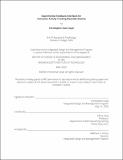| dc.contributor.author | Lloyd, Christopher Noel. | en_US |
| dc.contributor.other | Massachusetts Institute of Technology. Integrated Design and Management Program. | en_US |
| dc.contributor.other | Massachusetts Institute of Technology. Engineering and Management Program. | en_US |
| dc.contributor.other | System Design and Management Program. | en_US |
| dc.date.accessioned | 2021-10-08T16:59:15Z | |
| dc.date.available | 2021-10-08T16:59:15Z | |
| dc.date.copyright | 2020 | en_US |
| dc.date.issued | 2020 | en_US |
| dc.identifier.uri | https://hdl.handle.net/1721.1/132848 | |
| dc.description | Thesis: S.M. in Engineering and Management, Massachusetts Institute of Technology, System Design and Management Program, May, 2020 | en_US |
| dc.description | Cataloged from the official version of thesis. | en_US |
| dc.description | Includes bibliographical references (pages 59-62). | en_US |
| dc.description.abstract | Commercial wearable activity trackers have sophisticated monitoring capabilities and digital user interfaces that report personal health metrics; however, these devices have not yet achieved their goal of dramatically improving the wellbeing and performance of users. This research identifies latent aspects of wearables that might improve wellbeing. A group of commercial wearable users are interviewed to determine unmet and latent needs. Qualitative interview data is leveraged to propose a case study of a flower robot as a figurative feedback interface that uses moving mechanisms to express the user's sleep quality and promote improved sleeping habits. The robotic flower user interface is divided into two components that are fabricated and tested separately: 1) a flower that blooms and 2) a stem that changes posture. The control system is fabricated, programmed, and tested to successfully retrieve the researcher's personal sleep data from a public API and actuate the stem and flower. The flower robot prototype is a proof of concept of a novel commercial activity tracking wearable interface. Further testing is required to determine if a robotic avatar can increase relevant task performance, change user behavior change, or improve health metrics. | en_US |
| dc.description.statementofresponsibility | by Christopher Noel Lloyd. | en_US |
| dc.format.extent | 77 pages | en_US |
| dc.language.iso | eng | en_US |
| dc.publisher | Massachusetts Institute of Technology | en_US |
| dc.rights | MIT theses may be protected by copyright. Please reuse MIT thesis content according to the MIT Libraries Permissions Policy, which is available through the URL provided. | en_US |
| dc.rights.uri | http://dspace.mit.edu/handle/1721.1/7582 | en_US |
| dc.subject | Integrated Design and Management Program. | en_US |
| dc.subject | Engineering and Management Program. | en_US |
| dc.subject | System Design and Management Program. | en_US |
| dc.title | Experimental feedback interfaces for consumer activity tracking wearable devices | en_US |
| dc.type | Thesis | en_US |
| dc.description.degree | S.M. in Engineering and Management | en_US |
| dc.contributor.department | Massachusetts Institute of Technology. Integrated Design and Management Program | en_US |
| dc.contributor.department | Massachusetts Institute of Technology. Engineering and Management Program | en_US |
| dc.identifier.oclc | 1263244902 | en_US |
| dc.description.collection | S.M.inEngineeringandManagement Massachusetts Institute of Technology, System Design and Management Program | en_US |
| dspace.imported | 2021-10-08T16:59:15Z | en_US |
| mit.thesis.degree | Master | en_US |
| mit.thesis.department | SysDes | en_US |
